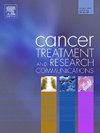分子分析强调TREM2是胰腺导管腺癌患者的鉴别生物标志物
IF 2.4
Q3 Medicine
引用次数: 0
摘要
预计到2030年,胰腺癌将成为癌症相关死亡的第二大原因,与乳腺癌或结肠直肠癌等其他常见癌症不同,胰腺癌的死亡率将继续上升。晚期诊断,往往伴随着转移性传播,极大地损害了患者的生存,并强调迫切需要改进的生物标志物来指导治疗策略。虽然分子特征已被提出用于胰腺癌患者的分层,但其预测预后的能力仍然有限。在这项研究中,我们将已建立的分子特征应用于我们来自胰腺癌患者队列的内部转录组数据。我们利用已发表的数据集构建了原发性和转移性胰腺癌中存在的细胞的综合图谱。转移样本图谱显示,与现有的分子分类相比,单核细胞/巨噬细胞特征提供了更好的鉴别能力。值得注意的是,表达trem2的巨噬细胞的丰度成为患者分层的重要参数。我们的研究结果将TREM2+巨噬细胞定位为胰腺癌的一种有前景的生物标志物,有可能增强患者分层并为靶向治疗的发展提供信息。这项工作强调了肿瘤相关巨噬细胞在胰腺癌进展中的关键作用,并为进一步的功能和转化研究奠定了基础。本文章由计算机程序翻译,如有差异,请以英文原文为准。
Molecular analysis highlights TREM2 as a discriminating biomarker for patients suffering from pancreatic ductal adenocarcinoma
Pancreatic cancer is projected to become the second leading cause of cancer-related deaths by 2030, with its mortality continuing to rise, unlike other common cancers such as breast or colorectal. Late-stage diagnosis, often accompanied by metastatic dissemination, drastically impairs patient survival and underscores the urgent need for improved biomarkers to guide therapeutic strategies. While molecular signatures have been proposed to stratify pancreatic cancer patients, their ability to predict outcomes remains limited. In this study, we applied established molecular signatures to our in-house transcriptomic data from a cohort of pancreatic cancer patients. We took advantage of published datasets to construct comprehensive atlases of cells present in primary and metastatic pancreatic cancers. The atlas of metastasis samples, representative of routinely harvested patient biopsies, revealed that monocyte/macrophage signatures provided superior discriminatory power compared to existing molecular classifications. Notably, the abundance of TREM2-expressing macrophages emerged as a significant parameter for stratifying patients. Our findings position TREM2+ macrophages as a promising biomarker for pancreatic cancer, with potential to enhance patient stratification and inform the development of targeted therapies. This work highlights the critical role of tumor-associated macrophages in pancreatic cancer progression and lays the groundwork for further functional and translational studies.
求助全文
通过发布文献求助,成功后即可免费获取论文全文。
去求助
来源期刊

Cancer treatment and research communications
Medicine-Oncology
CiteScore
4.30
自引率
0.00%
发文量
148
审稿时长
56 days
期刊介绍:
Cancer Treatment and Research Communications is an international peer-reviewed publication dedicated to providing comprehensive basic, translational, and clinical oncology research. The journal is devoted to articles on detection, diagnosis, prevention, policy, and treatment of cancer and provides a global forum for the nurturing and development of future generations of oncology scientists. Cancer Treatment and Research Communications publishes comprehensive reviews and original studies describing various aspects of basic through clinical research of all tumor types. The journal also accepts clinical studies in oncology, with an emphasis on prospective early phase clinical trials. Specific areas of interest include basic, translational, and clinical research and mechanistic approaches; cancer biology; molecular carcinogenesis; genetics and genomics; stem cell and developmental biology; immunology; molecular and cellular oncology; systems biology; drug sensitivity and resistance; gene and antisense therapy; pathology, markers, and prognostic indicators; chemoprevention strategies; multimodality therapy; cancer policy; and integration of various approaches. Our mission is to be the premier source of relevant information through promoting excellence in research and facilitating the timely translation of that science to health care and clinical practice.
 求助内容:
求助内容: 应助结果提醒方式:
应助结果提醒方式:


